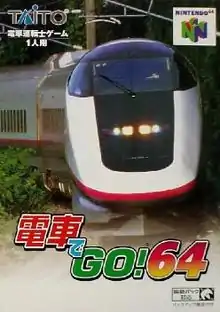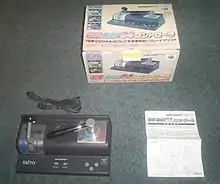Densha de Go! 2 Kōsoku-hen
Densha de Go! 2 Kōsoku-hen (Japanese: 電車でGO!2 高速編, "Go by Train! 2: High Speed Volume") is a train driving simulation game. It was released in Japan in 1998.
| Densha de Go! 64 | |
|---|---|
 Densha de Go! 64 box art | |
| Developer(s) | Taito |
| Publisher(s) | Taito |
| Platform(s) | Sega Dreamcast Nintendo 64 WonderSwan |
| Release |
|
| Genre(s) | Vehicle simulation game |
| Mode(s) | Single-player |
It was ported from Dreamcast[1] to Nintendo 64 and released as Densha de Go! 64 in Japan in 1999. Densha de Go! 64 supports its uniquely bundled train driving controller for Nintendo 64, which simulates actual train controls. It is one of two games that utilize Nintendo 64's Voice Recognition Unit (VRS). Like Hey You, Pikachu!, it is packaged with or without a microphone (called the Engineer's Pak),[2] which is used to announce train stations to passengers.[3] It is part of the Taito Densha de Go! series.
Gameplay
With 13 vehicles, on 16 missions, there are 7 main lines: Hokuhoku Line, Akita Shinkansen Line, Ōu Main Line, Tazawako Line, Keihin-Tōhoku Line, Yamanote Line, and the Tōkaidō Main Line.
Unique to the Nintendo 64 version[3]:20 is a Beginner Mode which allows 999 seconds for the player to complete either the Training Course, or Practice Course. The player is given an allotted amount of time to bring their train into the next station as well as a fixed time that the train was expected to arrive. If the player goes around curves too fast, stops suddenly or incurs other such dangers of train operation a few seconds are taken way from the remaining time they have to complete their task.

As with most Densha de Go! games, the Nintendo 64 version has a special controller which is plugged into controller outlet 3, while the voice mic is inserted into controller outlet 4, and a standard controller in outlet 1.[3]:8, 17 It consists of a switch on the left that goes up and down, and it controls the train's speed, all five of its drive speeds, and Neutral. The handle on the right controls the breaking speeds 1–8, Emergency brake, and doors opening. Between these two levers is a slot in which that the player can place a pocket watch or stop watch (not included but designed to look more realistic) to keep the time as they drive. There are five buttons, A, B, C, Start, and Select. The select button acts as the Z button to show distance to the next stop, in some game variations.[3]:9
Reception
In Japan, Game Machine listed Densha de Go! 2 Kōsoku-hen on their April 15, 1998 issue as being the third most-successful dedicated arcade game of the year.[4] On release, Famitsu magazine scored the Densha de Go! 64 at 32 out of 40.[5]
Fan translation
On April 1st, 2017, an English fan translation patch was released for download which could be used with an emulator or flash cartridge. Developed by Nintendo 64 ROM hacker "zoinkity" and translator "mikeryan", the patch translates to English all HUD and menu elements as well as English-language support for the North American version of the Voice Recognition Unit peripheral.[6]
References
- Jeff Rouner (June 24, 2013). "Ten Things You Probably Didn't Know About the Sega Dreamcast". Houston Press. Retrieved May 28, 2018.
- "GDR ニンテンドウロクヨン ソフト一覧 1999年 – NINTENDO64 Software List 1999". Archived from the original on July 21, 2012. Retrieved July 19, 2008.
- Densha de Go! 64 Perfect Program (Official Guide Book).
- "Game Machine's Best Hit Games 25 - 完成品夕イプのTVゲーム機 (Dedicated Videos)". Game Machine (in Japanese). No. 562. Amusement Press, Inc. April 15, 1998. p. 21.
- ニンテンドウ64 – 電車でGO!64. Weekly Famitsu. No.915 Pt.2. Pg.28. June 30, 2006.
- Watts, Martin (April 3, 2017). "Densha de Go! 64 English language patch now available". N64 Today. Retrieved January 20, 2019.